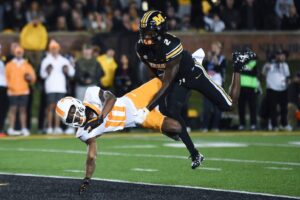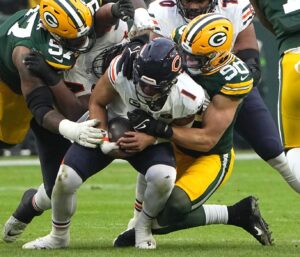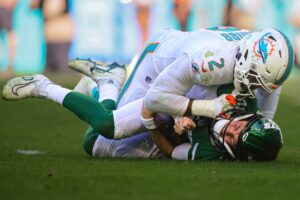While it is said that time heals all wounds, the scars left behind act as constant reminders of the devastation that once was.
The Gulf Coast, post-Hurricane Katrina, not only bears the structural scars of a region littered with abandoned and eliminated homes but the physical and emotional scars of its community remain, nearly 13 years after the levee broke. Even now, stories continue to be told through YouTube. One video after the next, residents paint those desperate and unimaginable pictures and none better than former Marine and local poet and creative writing teacher, Shelton Alexander.
Shelton Alexander: Surviving in the Superdome During Hurricane Katrina
Alexander, while born in Virginia, is a New Orleanian through and through. At just two weeks old, he moved to Uptown New Orleans and has migrated to Mid-City, Downtown, Upper Ninth Ward and eventually to Violet where he currently resides. He has the “504” accent that you’d expect and, of course, loves his New Orleans Saints.
As Katrina hit, Alexander found himself in a desperate situation. Trapped on Airline Drive in a traffic jam in his gas-depleted pickup truck, he didn’t think he would reach his destination of Baton Rouge. The choice was either run the risk of becoming stranded or take a detour to wait the storm out for a day or two in the Superdome. He chose the Superdome. Alexander mentioned he remembers thinking, “Ok, cool. We’re at the Superdome. What could go wrong?”
From Bad to Worse
By the time Alexander arrived, the National Guard had already established command of the venue. The lack of leadership was apparent when information about the storm was not available. Furthermore, the food being distributed turned out to be M.R.E.’s (military rations meaning, Meal – Ready to Eat). These M.R.E.’s require preparation which was never explained to the civilians. Alexander took the time to teach as many people he could how to prepare the food for consumption. Despite the lack of direction, the overall mood of the temporary residents of the Superdome was content, all things considered.
It didn’t take long for the situation in the Superdome make a turn for the worse. By the next morning, Alexander woke to the sounds of thunder which would later be replaced by loud crashes as the roof began to come apart. Shortly after, the roof had been compromised and the rains of Katrina began to find their way into the structure.
The Effects of Katrina on the People
Alexander reflected on the change in demeanor amongst the crowd.
“It started getting real crazy with the bathrooms getting backed up and everything,” he said. “Everybody was on edge. That’s when it started getting a little chaotic.”
He would continue to describe the situation of people overcome with fear for the people outside, the reports of suicide, rape, and gunshots. It goes without saying that it was a desperate time for those in the Superdome.
“To watch the elders suffering, patients sitting in the corner all day, unattended, it was just really bad”, Alexander shared. “By the time the levee breached, we kept hearing more and more stories of people being stuck in attics and on rooftops. We were wondering what was going on.”
Alexander described the situation getting worse as the security measures for newcomers to the Superdome were no longer being followed. Dealers penetrated the once secure gates and brought drugs into the venue.
Alexander would help himself cope with the disaster by praying and reciting poetry, poetry that was written for a competition he was due to attend. Being an artist, he also documented some of his experience on video.
Basic Necessities
As the situation worsened, and people continued to come to the Superdome. Inhabitants’ needs outweighed the food and water available.
“Even though the National Guard was distributing some cases of water, it was at certain times,” he described. “If you missed that time, you’d have to wait another six hours, wait an hour or two in line and you’d get one M.R.E. and a scorching hot bottle of water. Then you’d have to use some of that water to heat up the M.R.E.”
He then mentioned at this point, he was in survival mode, willing to take any unwanted M.R.E.’s and joked that all he needed “was a little hot sauce”.
The former Marine was confused why it was so hard getting basic necessities to the people.
“It’s taking them so long,” he said. “What is the holdup? Being in the service, I know that you can get food overseas in a matter of hours or a day at most. We are right here in the city and we’re about to starve to death or get dehydrated. Not knowing if they would just hold us in there against our will and starve us to death crossed our mind.”
The threat of fights and an all-out riot grew as the situation became more desperate. Also, having no power meant no one could charge their phones. This eventually made it impossible to speak with family/friends on the outside, which only added to the tension.
From Sanctuary to Cell
The National Guard, being concerned for people’s safety outside the walls of the Superdome, decided they would not let people leave, manning every gate of the structure.
“We went to each gate, one by one, to see if they would let us out and they wouldn’t,” Alexander recalled. “We went on the backside between the Superdome and the Hyatt Hotel and we noticed the entrance to walk up was finally open. This hadn’t happened before. They were really holding us back.”
He would then share that he fled the Superdome and made it back to his pickup truck, which was miraculously still dry. Alexander arrived only to realize that he didn’t have his keys. He spent the next three hours searching the Superdome in and out to find the person holding the bag with his keys, as well as rounding up some family and friends to leave, all while the water was still rising.
Survivor’s Guilt
Just as the seams really appeared to be coming off the Superdome and gunshots rang in the air, Alexander escaped the captivity of the Superdome. His unplanned search around the dome proved to be a blessing in disguise as he would end up finding some people from his parish and was able to offer them the same ticket out. All-in-all, including himself, Alexander was able to fit 20 people in his truck and rescue them from the unstable confines of the Superdome.
Leaving the Superdome, Alexander described driving in first gear through water that came up to, but not into, the windows of his truck. Alexander would make it out of the area. What would seem to be a moment to celebrate sat with him in a different way. As Alexander tried rescuing as many people as possible, he passed many others with desperation in their eyes. A feeling of guilt came over him. Despite this guilt, however, he realized how lucky he was.
“As we were getting closer to our destination, Baton Rouge, all this stuff starts setting in,” he mentioned. “We really just got out of there. I was happy though when it was all over.”
Alexander was referred to as an angel by many of the people he helped during his escape. While he still remembers the faces he couldn’t help, he is much more at peace with what transpired and how he was able to help so many.
“I do better with it now,” he noted. “I did what I could do. The National Guard has the ability to transport people from the wet areas to dryer ground. If I could have taken my truck back and forth, I would have done that. But you had all the forces that were not allowing that to happen. If I would have turned around and gone back, they would have shut me down like they did to other people.”
After the Devastation, Why Stay?
Alexander decided to stay in the New Orleans area after the water had receded. Why?
“I’m just trying to do my part”, Alexander explained. “The work there with the kids is probably the main reason I stuck around. Teaching creative writing and poetry since 2006, I just care about those kids.”
Alexanders continues to not only teach the youth but also contribute to a writing program that constantly fights for funding continue to drive him.
“I know my role is to help,” Alexander added. “My teaching really helps settle the kids. It helps them find their voices. It helps them to tell their own stories and that’s been really crucial. I could have packed my bags a long time ago. I wanted to be an inspiration to my community.”
Alexander refers to this focus as his “own personal crusade”.
The Community Now
While some of the communities were able to pick up the pieces and start rebuilding fairly rapidly, others remain virtually abandoned.
“The Ninth Ward just looks so wide open,” he said. (A lot of) empty lots where houses once stood.”
He then mentioned that many of the lots that weren’t claimed by the residents or family members often are taken by the local government. In his estimation, he doesn’t see anyone coming back anytime soon.
The New Orleans Saints
This discussion couldn’t end without talking a bit about the Saints. After all, Alexander was a contributor to the NFL Films video about the rebirth of the Superdome. Alexander’s contribution to that documentary was a poem about his stepfather.
“My stepdad was a huge Saints fan. He’s what made me a fan”, he shared. “His (Alexander’s Stepfather) funeral was on the night of that blocked punt by Steve Gleason”.
Alexander’s story just adds even more magic to that moment.
Alexander reminisced about the role the Saints played in his family and all the Super Bowls that could have been; 2009, 2011, 2013 and obviously 2017. “We’d have smashed Philly. Philly had a great defense, but Drew Brees would have outdone them. Then we would have outdone the Patriots.”
It would have been a remarkable end to an outstanding season.
For Alexander, following the Saints is a fantastic distraction from what issues still exist in St. Bernard’s Parish and the city as a whole. He has an infectious sense of optimism without losing touch with reality. He continues to do more than his part of the ongoing process to rebuild his community and like so many others in New Orleans, he has the scars to prove it.






